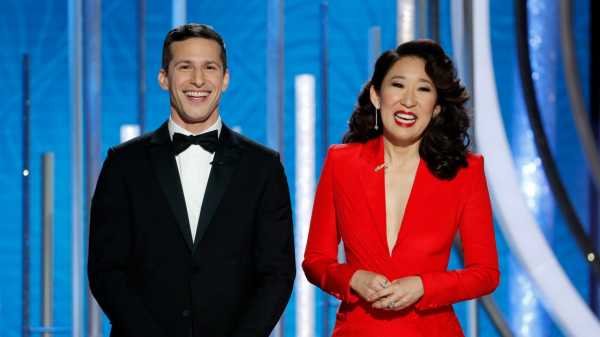
“This moment is real,” Sandra Oh informed the audience, at the top of the seventy-sixth annual Golden Globe Awards. Judging from the smatterings of laughter, it sounded like the audience wasn’t sure whether to believe her. But she was, in fact, being totally real. Oh, co-hosting with Andy Samberg, had put the brakes on their hit-or-miss comic monologue to speak from the heart. “I said yes to the fear of being on this stage tonight, because I wanted to be here to look out into this audience and witness this moment of change,” she said, her voice quavering.
Has the progress been real? Are the Golden Globes real? Granted, it’s not an easy era in which to gauge reality, but Oh’s message—which upended the usual jokey-to-uplifting flow of awards shows—cut to the core of what was strange and unsettled about last night’s broadcast. In the past few years, as Hollywood has roiled from the #OscarsSoWhite controversy, the rise of Donald Trump, and the #MeToo reckonings, the Golden Globes have functioned less as a champagne-soaked yuk-fest than as an unlikely venue for catharsis and revolt. There was Meryl Streep’s anti-Trump speech of two years ago, a starting pistol for Hollywood’s resistance. Last year, there were Time’s Up pins affixed to black dresses on the red carpet and Oprah Winfrey’s bracing oration, promising that a new day had dawned.
But has it? For the first time in recent memory, no fresh societal spasm required this year’s Golden Globes to function as a battle zone. As Oh’s moment of realness suggested, Hollywood was content to relax into progressive back-patting, much of it perfectly sincere but lacking the same urgency. The fact that the Globes had a host at all—much less two of them—seemed reason enough to celebrate. The days leading up to the show saw an exhausting and demoralizing second act to the Kevin Hart drama that has plagued the show’s fancier cousin, the Oscars. If you haven’t kept up, the short version is: he was in, he was out, he was on “Ellen,” he was thinking about it, and then, once again, he was out. Between all those steps, people were still rightly furious over his homophobic “tweets of old,” as he called them. Now the Oscars, for the first time since 1989, might go host-less.
But that was no concern of the Globes, which had softened its tone significantly since last year, when even the red carpet had the air of insurgency. The 2019 red carpet was back to correspondents asking “Are you excited to be here?” and drooling over Lady Gaga’s gown (which was, to be fair, drool-worthy). Instead of Natalie Portman’s cheeky-badass line “And here are the all-male nominees,” when introducing last year’s contenders for Best Director of a Motion Picture, this year we had Harrison Ford introducing another all-male slate without comment. Nor, by my count, was there a single mention of the current President. The only politician to get slammed was Dick Cheney, played by this year’s Best Actor in a Musical or Comedy, Christian Bale. “Thank you, Satan, for giving me inspiration for how to play this role,” he said, at the point of the speech where people used to thank Harvey Weinstein.
Elsewhere, there were satisfied nods to change. Rachel Brosnahan, who won for her role in “The Marvelous Mrs. Maisel,” thanked its showrunner, Amy Sherman-Palladino, saying, “Our village is a matriarchy.” Regina King, who won for her supporting role in “If Beale Street Could Talk,” filibustered the play-off music to promise that any project she produces will be staffed fifty per cent by women. And Brad Simpson, an executive producer of the winning miniseries, “The Assassination of Gianni Versace: American Crime Story,” spoke of the “fear and hate” that surrounded Versace’s death. “Our show is a period piece, but those forces are not historical,” he said. “They’re here, they’re with us, and we must resist.” A worthy message, if not a perfect fit for this grisly saga of pathological narcissism. Still, it’s hard to fathom Kevin Hart hosting a show where such words are spoken.
Adding to the feel-good vibe (along with Timothée Chalamet’s bedazzled harness and Olivia Colman, of “The Favourite,” saying, “Cor, blimey!”) were two beloved old-timers picking up lifetime-achievement awards. Short of Mr. Rogers, there is no more comforting face to see on television than that of Carol Burnett, who won a new TV-legend prize named in her honor. “Does this mean I get to accept it every year?” she wondered aloud, before admitting, “Sometimes I catch myself daydreaming about being young again and doing it all over.” She signed off with her signature farewell: “I’m so glad we had this time together,” plus a tear-summoning tug of her earlobe.
Later on, Jeff Bridges accepted the equivalent award for film. Has anyone ever made a lifetime of movie stardom sound so easy-peasy? To his siblings, he said, “How lucky are we to have our folks, man?” To his representatives: “They’re keeping the boat afloat.” To the director Scott Cooper: “Scott, man, sets a great vibe to make wonderful stuff happen.” The Dude concluded by talking about the architect Buckminster Fuller—you know, “Bucky”—who liked to compare leadership to trim tabs, the little rudders that help big rudders turn around giant ocean tankers. “All of us are trim tabs,” Bridges told the crowd. “We may seem like we’re not up to the task, but we are, man. We’re alive! We can make a difference. We can turn this ship in the way we want to go, man.” Easy-peasy, right?
As for the competitive categories, the results were—to use an industry term—totally batshit crazy. As any awards junkie will tell you, the Hollywood Foreign Press Association likes to do its own thing, and that thing is often too weird to help out much with Oscar predictions. Alfonso Cuarón, the director of “Roma,” collected the awards for Best Director and Best Foreign Language Motion Picture, but the film was ineligible in the over-all drama category—not so at the Oscars. The critically polarizing “Green Book,” a tale of race relations in the Deep South, managed to win Best Musical or Comedy, while the critically maligned but commercially successful “Bohemian Rhapsody,” in which Freddie Mercury sings about Scaramouche possibly doing the Fandango, managed to win Best Drama. In a word: huh?
Google, meanwhile, had a big night when it came to people typing, “What is ‘The Kominsky Method’?” As it turns out, it’s a Netflix sitcom that premièred less than two months ago, and it’s your new Golden Globe winner for Best Television Musical or Comedy. Surprise! Its star, Michael Douglas, also won the first award of the night, and he thanked his hundred-and-two-year-old father, Kirk Douglas. (“Alter kakers rule!”) But the biggest upset came after the eleven o’clock mark, when Glenn Close beat the Lavender Lady Gaga for Best Actress in a Drama. One of the best actors of her generation, Close is a perennial also-ran when it comes to awards—but “The Wife” has given her a push down Oscar lane. Even so, she seemed genuinely shocked when she heard her name, and she took the opportunity to give the best speech of the night.
Of the movie’s long road to production, she said, “It was called ‘The Wife.’ I think that’s why it took fourteen years to get made.” She spoke of her mother, “who really sublimated herself to my father her whole life. And, in her eighties, she said to me, ‘I feel I haven’t accomplished anything.’ And it was so not right.” (Close’s father was a prominent surgeon who at one point served as the Congolese leader Mobutu Sese Seko’s personal doctor, and who enrolled his own family in the conservative religious group the Moral Re-Armament.) “Women, we’re nurturers,” Close continued. “That’s what’s expected of us. We have our children. We have our husbands, if we’re lucky enough, and our partners, whoever. But we have to find personal fulfillment. We have to follow our dreams. We have to say, ‘I can do that, and I should be allowed to do that.’ ”
The crowd rose to its feet, because Close had finally given the show what it needed: an appeal to change that was less about optics than about how deeply our lives are felt and how often they go unrewarded. She was a trim tab, man, and the moment was real.
Sourse: newyorker.com






